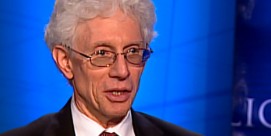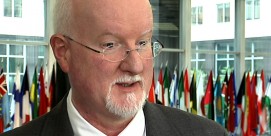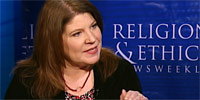In This Episode << SLIDE LEFT TO SEE ADDITIONAL SEGMENTS
Commentary: The 2004 Election
Read more analysis and commentary from scholars around the country on religion and the 2004 election.
Mark J. Rozell, Professor of Public Policy, George Mason University:
In 2000, turnout among the core constituency of the religious Right was a disappointment to the Republicans. Bush and his campaign people were very aware that they needed to mobilize those white evangelical conservatives who sat out the 2000 election. The effort this time was hugely successful and probably gave Bush his margin of victory. Bush spent four years cultivating the religious Right constituency. With Bush in the White House another four years and Congress more strongly controlled by the GOP, religious conservatives have much to celebrate. This might be the best opportunity ever for the movement’s agenda to succeed.
For Democrats, the new slogan should be “it’s the culture, stupid.” The party has to find a way to bring back white evangelicals and churchgoing Catholics who have abandoned the party.
George Hunsinger, McCord Professor of Theology, Princeton Theological Seminary:
Our presidential election was, for much of the world, a referendum on the politics of deceit.
The administration did not tell the truth in leading our nation into war. It is deeply implicated in allegations of torture. It has bombed, and continues to bomb, densely populated areas like Fallujah, Tal Afar, and Sadr City, causing massive civilian casualties. Not least, it has perpetrated such enormities under the cover of pious falsehoods.
Only a twisted view of morality can have been at stake if “moral issues” mattered most to voters and were key to President Bush’s win. The catastrophes that lie before us are now incalculable. We have sown the wind and will reap the whirlwind.
Stephen V. Monsma, Research Fellow, The Henry Institute for the Study of Christianity and Politics, Calvin College:
The fact that more people cited “moral values” as the most important issue in this election is astounding.
More cited this issue than cited war in Iraq, or the economy, or terrorism. I believe the reason for this — and this is based on my intuition, not hard data — is the same-sex marriage issue. The gay rights activists may have overreached themselves in pushing in the courts for same-sex marriage. Their doing so may very well have raised the visibility of cultural/social issues in many people’s minds, leading them to go to the polls when they otherwise might not have done so and raising their level of concern over where our nation is going in terms of such issues.
The fact that almost 80 percent of those who cited “moral values” as their most important issue voted for George W. Bush suggests the extent to which Bush was helped by the high visibility of this issue. This 80 percent also no doubt overlaps with Protestants who reported attending church weekly, 70 percent of whom voted for Bush, and Catholics who reported attending church weekly, 55 percent of whom voted for Bush. Since about 40 percent of all Americans attend church weekly, the Democrats will have a hard time electing a president until they are more sensitive to the concerns of the churchgoing populace. There are ways they can do this and still largely maintain their liberal issue positions, but they must become much more sophisticated in doing so.
Mark D. Regnerus, Assistant Professor of Sociology, University of Texas at Austin:
The Democratic Party in the U.S. needs some housecleaning. They continue to alienate a large portion of the American electorate — evangelical Protestants and traditional Catholics — primarily by failing to moderate some of their socially liberal positions. We presently do not live in a nation where “it’s the economy, stupid.” As the exit polls showed yesterday, “it’s moral values, stupid.” Many American Christians are actually quite flexible about economic issues such as taxes and big- versus little-government arguments, much more so than either party realizes. They are also more flexible on stem cell research. It’s obvious they are not flexible on gay marriage (nor are most Americans, religious or otherwise). However, such religious conservatives don’t appreciate the treatment they get from the Democratic Party and their high-profile spokespersons. Bush speaks their language, as the exit poll numbers from white conservative Protestants revealed. In the end, America’s religious conservatives are spooked by the left wing of the Democratic Party.
If Democrats want a shot in 2006 or 2008, the platform on social issues (e.g., abortion rights, gay marriage) has got to be moderated, shocking as that may sound to party members’ ears. I believe the evidence suggests that pro-life Democrats would appeal to many religious conservatives, especially Catholics, but the Democratic Party continues to chew them up and spit them out.
Laura R. Olson, Associate Professor of Political Science, Clemson University:
The long shadow of Ronald Reagan looms large over Tuesday’s election results. The political mobilization of evangelical Protestants that Reagan began has been the most important change in the past quarter century of American electoral politics. Reagan’s appeal to evangelicals was primarily rhetorical; in the end, his administration did not deliver many concrete policy outcomes to the evangelical constituency. Yet the Reagan phenomenon led to a lasting political realignment, first in the Southeast (when he took millions of votes away from the devout Baptist Jimmy Carter) and later across the United States in rural communities. This political realignment has led many people of faith to view the Republican Party as the only party that takes its needs and concerns seriously. Karl Rove is well aware of this fact and made mobilizing evangelicals at the precinct level the centerpiece of George W. Bush’s reelection strategy. Because President Bush is himself an evangelical Protestant, he is all the more able to stimulate loyalty and affection among evangelical Republicans. They clearly believe that Bush is one of them. In a stunning turn of events, the economy and the war in Iraq were less important to millions of voters than the nebulous notion of “moral values.”
The Democratic Party needs to address the fact that it is no longer widely perceived as having a prophetic moral vision. Among many evangelicals, Democrats are seen as scornful, secular, urban literati who do not understand or appreciate their traditional lifestyles. For most of the twentieth century, however, this was not the case. Democrats were the party of social justice, fighting against racism and poverty in a way that squared well with the beliefs and orientations of many people of faith across the United States. The Reagan era swept this more liberal religious-political witness off of the political stage, and the “religious Left” in this country is flailing today. Left-leaning groups, including Sojourners, tried very hard during Election 2004 to encourage voters of faith to believe that “God is not a Republican.” Yet Democratic candidates, including John Kerry, are not doing a good job explaining their political views in terms of moral vision. In his speech at the Democratic National Convention, John Edwards did speak briefly of the “immorality” of poverty, but this theme did not carry forward throughout the fall campaign. John Kerry’s own public discussion of the relationship between faith and politics was consistently stilted and unclear. If they wish to succeed in future presidential elections, Democrats need to ask themselves how they can reach out to voters of faith with their own version of morality politics.
Robin W. Lovin, Cary Maguire University Professor of Ethics, Southern Methodist University:
Apparently, it’s not the economy, anymore. If the exit polls are right, people are making their political choices in light of moral considerations. Perhaps they have always done so, even if the pollsters never thought to ask them about it until some specific moral questions became important in the 2004 campaign. Liberals who have characteristically built consensus for economic justice, public education, corporate responsibility, and even world peace by appeals to self-interest may have to think again about the moral foundations of justice and peace, if they want to regain a place in this part of the public discussion.
Of course, making a moral case for justice and peace might increase the polarization in society by mobilizing a new corps of intolerant social liberals to match the intolerant social conservatives who may have tipped the balance last Tuesday. It’s not clear that a political system that tilts 51 percent to 48 percent toward the goals of intolerant liberals would be superior to the one we have, although I would probably be marginally more pleased with the results.
What might improve the situation would be new attention to the health of the discussion itself. We want to elect presidents who will represent our values and support legislation that will enforce our moral choices because we have no confidence in our ability to explain those choices to our neighbors or persuade them to see their moral universe as a place where we could live together. If there were forums for broad, public moral discussion in our religious institutions, universities, and local communities, we might not need to rely on a quadrennial barrage of attack ads and talk radio to try to get the point across. And if the issues that divide us culturally actually could be debated in the wider culture, then all of us, liberals and conservatives alike, might begin to hold politicians accountable for the problems that politics really can solve, instead of electing them as symbols of the values that we could represent better with our own lives and voices, closer to home.
Corwin Smidt, Director, The Henry Institute for the Study of Christianity and Politics, Calvin College:
Consistent with Karl Rove’s strategy to energize and mobilize President Bush’s base as a means to secure Bush’s reelection, evangelical Christians did play an important role in shaping the outcome of the 2004 presidential election. However, in these initial days following the election, less has been made of another important factor in shaping that outcome — namely, the Catholic vote. Over the course of the past several decades, the historic Democratic character of the Catholic vote has been dissipating. In the 2000 presidential election, exit polls revealed that 46 percent of Catholics had cast their [votes for] Bush. Not all of Rove’s strategy, however, was to energize the base vote; the Bush-Cheney ticket also sought to “peel off” more Catholics from the Democratic coalition. Major efforts were made to court the Catholic vote, particularly among those Catholics who were the religiously faithful. This strategy also appears to have paid off, as the exit polls in 2004 revealed that 52 percent of all Catholics reported having cast their ballots for Bush — an increase of 6 percent between 2000 and 2004 for Bush. And this is all the more remarkable given that Senator Kerry is a Roman Catholic. Clearly the level of Catholic support for Kerry stands in stark contrast to Catholic support given to Kennedy less than 50 years ago.
Richard B. Miller, Professor of Religious Studies and Director of the Poynter Center for the Study of Ethics and American Institutions, Indiana University:
That many of the voting public judged the Republican Party to be a steward of moral values is one of the great ironies and depressing facts of the 2004 presidential election. One can only guess what voters thought those values to be. Likely topics include the proposed constitutional amendment banning same-sex marriage; the ban on partial-birth abortion, and the ban on publicly funding stem cell research. Notice what is missing from this list: the injustice of the war in Iraq; disregard for the environment; rising poverty; corporate corruption at home and crony capitalism abroad; loss of health care coverage for millions; intolerance of dissident speech; an enormous deficit; ongoing nefarious arms trading; tax cuts for the wealthy; and weakening of the social contract and the safety net that it ought to provide. The Republicans succeeded in heaping moral confusion on the American people by turning attention away from macro issues involving social and infrastructural problems toward micro issues of family, sex, and the body. They did so by way of a three-fold strategy.
First, they simplified moral issues. Absent was the idea that social, ethical, and political issues are complicated, that moral inquiry proceeds dialectically, that arguments on various sides need to be considered in a measured and careful manner. Moral issues, now absorbed into the fractious culture wars, have been reduced to matters of a sound bite, allowing for little time or nuance. Indeed, “nuance,” like “liberalism,” has achieved the status of a pejorative term. On this landscape of moral simplicity, positions are polarized and opponents of the Republicans’ conservative positions are demonized, aided in no small part by pugilistic media personalities on television and radio. Gone is the sense of reciprocity, mutual respect, and fair play that should constitute the exchange of ideas in situations of moral disagreement.
Second, they somatized what counts as “moral.” Each of the items I mention on the Republican agenda has to do with the body. To be sure, bodily morality is no small matter. (I want to note in passing how this election reveals the intransigence of American homophobia.) But confining moral issues to matters of sex and medicine crowds out much of what affects the quality of American life. The Republican Party reduced the macro items on my list to economic and political matters, thereby emptying them of real ethical content and turning them into problems that are resolvable solely according to strategic calculations of self-interest and efficiency.
Finally, they psychologized moral issues, turning them into matters of sincerity. In this, they echoed the worst features of identity politics. The Bush administration ignored appeals to empirical reality as a basis for sorting out good arguments from bad, scientific fact from ideological commitment, reality from fantasy, truth from falsehood. Commitment to moral realism and public accountability for policy decisions was replaced by esteem for unwavering conviction, however ill-advised. Frequently we were reminded that the people know where the president stands, what values he holds dear. The effect was to say that what counts as a moral value is entirely subjective, and that a citizen should cast his or her vote for the candidate who appears more deeply earnest in front of a camera.
One of the Republicans’ signature themes going into and coming out of the election was “faith and the family.” But by neglecting social, environmental, and other factors within which families grow and develop, the Republicans distracted the electorate from issues that bear directly on our wider health and well-being. The effect was to sentimentalize the family, underwriting the false picture of families as lifestyle enclaves and havens in a heartless world. But we all know better. Families are not only important institutions for intimacy and psychological development; they are also domestic economies, as any parent who balances the monthly budget surely knows. Each family’s welfare depends on its wider moral, environmental, legal, political, and economic context. Cordoning off the family from these matters of context and political policy does us a great disservice.
It is tempting to wax sanctimonious about each of these strategies and their effects, but I rather think that many of my colleagues in the academy have aided and abetted this decline of critical reasoning and moral inquiry. Captivated by fashionable platitudes about power from the postmodern Left or quaint bromides about tradition by the confessional Right, much work in religion and ethics is characterized by the neglect of empirical detail, a lack of courage for normative debate, or a failure to appreciate basic distinctions that help clarify moral reasoning. A disproportionate amount of what passes as scholarship today suffers from precisely the defects that the Republicans have exploited to their advantage and to the nation’s detriment. All of us who teach religion and ethics in higher education have our work cut out for us over the next four years, and beyond. It is often said that the devil is in the details. Right now, the details seem to be where even angels fear to tread.
Ellen T. Charry, Margaret W. Harmon Associate Professor of Systematic Theology, Princeton Theological Seminary:
It is not only the Democrats who have lost the confidence of the American heartland. So has nonevangelical Christianity. Perhaps the dumbing down of America has enabled shallow thinking about complex social, cultural, and international issues to win the day. Bravado after being attacked on our own soil seems linked in the popular religious mind with a swaggering smugness about sex-related matters. A slick veneer of sexual morality to hide a basically punitive attitude toward those not like us gives the short-thinking Christian voter a self-congratulatory sense of moral superiority. Shame on those Christians whose faith has forgiveness and reconciliation at the core of its identity yet who have betrayed their Lord for such tawdry braggadocio. At the moment, evangelical leaders carry heavy responsibility for the leadership of their community.
As shallow as the avowedly “Christian” electorate appears to be, the Democratic Party and the peace and justice churches should heed the admonition that their interlocked message no longer resonates with a large segment of the American people. This is not to suggest that “liberals” abandon their traditional commitments for the sake of political survival, but that they listen attentively to the rebuff they have received in this election. The temptation of self-righteousness is like the devil who prowls around like a roaring lion looking for someone to devour in 1 Peter. It is pathetically tempting to divide the cosmopolitan from the redneck and close one’s ears. Complacency on either side may be comforting, but it is ill-conceived.
Theology cannot be apolitical. Yet how theological commitments translate into political activity in any age is a perennial task. Christians have long debated the proper relationship of the church to the state. Most often Christians have sought to be loyal citizens building up the body politic by supporting marriage, military service, taxes, and the law of the land. Some Christians have vowed withdrawal from the state on the ground that they serve a greater master. It is always important that the administration of any state or the issues of the day never be confused or conflated with the Lord that Christians serve. Sadly, at this point, Christians do not have a monopoly on clarity of mind.
Nancy J. Duff, Stephen Colwell Associate Professor of Christian Ethics, Princeton Theological Seminary:
As a result of President Clinton’s lies about his extramarital affair with a White House intern, he was impeached. His immoral behavior (both the affair and the subsequent lies) dominates many people’s assessment of his presidency. Under President Clinton our nation saw a significant increase in jobs, a strong stock market, a balanced budget, and strong international support for our country, but what is most often remembered about his presidency is his sexual misconduct. When, on the other hand, President Bush lied about the reasons he took the United States to war with Iraq, his immoral behavior (both the war and the lies he told about the war) resulted in no serious setbacks to his presidential authority, and now he has been reelected president for a second term. Why did one kind of immoral behavior (an extramarital affair) bring one president down, while another kind of immoral behavior (going to war on false pretenses) had little effect on the credibility of another?
From an ethical point of view, our country has entered an odd arena where issues regarding the economy, terrorism, war, health care, civil liberties, the creation or loss of jobs, and taking care of the environment are not placed under the category of “moral values.” The term “moral values” has come to refer exclusively to more personal issues such as abortion, homosexuality, and the integrity of marriage (although why these issues are more personal than loss of jobs or access to health care is unclear). How is it that war, poverty, loss of jobs, curtailment of civil liberties, access to health care, and taking care of our natural resources are not also considered serious moral issues?
Like many people who voted against President Bush, I fear for the future of our country. We have a president who believes that a two-percentage-point margin of victory constitutes a “mandate” from the people, and who believes that he has a mandate from God to lead this country, a belief which makes him unable to admit to any mistakes or even have second thoughts about his actions. He lied to the country about Iraq and led us into war with a country that had nothing to do with the terrorist acts of September 11. He tells us that it will take “hard work” to win the war in Iraq, while refusing to allow photographs of the coffins of soldiers whose hard work resulted in the loss of their lives. He has violated people’s civil liberties; his “leave no child behind” program has been a dismal failure; his policies have led to the loss of jobs, increased financial success for the wealthy, and even more limited access to health care for those who were already on the margin. Ironically, none of these actions fall under the category of “moral values” in the minds of many who reelected him.
Since religious beliefs played such a large role in this election, one must examine the influence of conservative evangelical churches in restricting the term “moral values” to such concerns as abortion, homosexuality, prayer in school, and posting the Ten Commandments in public institutions, while denying the designation of “moral values” to such concerns as the economy, health care, the environment, terrorism, and civil liberties. During times of war (such as Vietnam, the Gulf War, and now the war in Iraq) conservatives have been allowed to define what it means to be patriotic. Those of us who are active members of Christian churches, but who define morality in a much broader way than conservative evangelicals do, should ask ourselves if we are now willing to allow conservative evangelicals to define what constitutes moral values.







